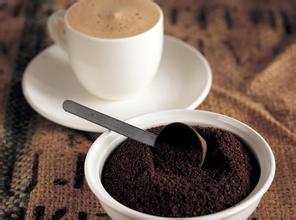Description of the flavor of Kenyan coffee varieties with bright flavor introduction to fine coffee beans in the producing area
Kenya has a total population of 41.8 million (2013), with a population growth rate of 2.7 per cent. There are 42 ethnic groups in the country, including Kikuyu (17%), Lucia (14%), Kalenjin (13%), Luo (10%) and Kangba (10%). In addition, a small number of Indians and Pakistanis, Arabs and Europeans are located in tropical monsoon areas, most of which have a savanna climate, hot and humid coastal areas and mild plateau climate. The rainy season is from March to June and from October to December, and the rest is dry season. The annual rainfall decreases from 1500 mm to 200mm from southwest to northeast. Nairobi, the capital, has a mild climate, with an average annual temperature of 17.7C and annual rainfall of 1049 mm. Kenya's mineral deposits are mainly soda ash, salt, fluorite, limestone, barite, gold, silver, copper, aluminum, zinc, niobium and thorium, except soda ash and fluorite. Most mineral deposits have not yet been developed. The main minerals are barite near Tamota in the southeast, niobium in the Mlima Mountains and gold from Kakamaga and Makajie in the southwest. Kyrgyzstan is one of the largest diatomite mines in the world. Lake Magadi is rich in natural alkali and salt.
The Kenyan government takes the coffee industry very seriously, where it is illegal to cut down or destroy coffee trees. Kenyan coffee buyers are world-class high-quality coffee buyers, and no other country can grow, produce and sell coffee on a continuous basis like Kenya. All coffee beans are first acquired by the Kenya Coffee Commission (CoffeeBoardofKenya, CBK), where they are identified, graded, and then sold at weekly auctions, where they are no longer graded. The Kenya Coffee Commission only acts as an agent to collect coffee samples and distribute them to buyers so that they can determine the price and quality. The auction in Nairobi is for private exporters, and the Kenya Coffee Commission pays growers a price below the market price. The best coffee grade is bean berry coffee (PB), followed by AA++, AA+, AA, AB and so on. The fine coffee is shiny, delicious and slightly alcoholic. Auctions are also organized to meet the needs of dispatchers. This kind of auction usually has a small auction volume (3-6 tons each), with samples with the grower's logo for buyers to enjoy. After the auction, the exporters pack according to different flavors, different qualities and the quantity required by the blenders. This provides a great deal of flexibility for the dispatcher. Quality-conscious Germans and Scandinavians are long-term buyers of Kenyan coffee with fragrant, rich, fruity flavors and a rich and perfect taste. Kenyan coffee has a wonderful fruit flavor, tastes like BlackBerry and grapefruit, and is a favorite of many coffee gluttons. This coffee has an excellent medium purity, crisp and refreshing taste. It has a fresh flavor and is most suitable for drinking iced coffee in summer. When tasting this coffee, if it is paired with sour fruits such as grapefruit, it will certainly give me the best coffee experience. "not much like coffee, but a bit like fruit tea" is the common feeling of many people about this kind of shallow roasted Kenyan coffee. In addition to having obvious and charming fruit acidity, Kenyan coffee is mostly from small coffee farmers, planted in a variety of different environments, encounter different climate and rainfall every year, and bring a variety of distinct and unique personalities. Take the AAPlus grade "KenyaAA+Samburu" as an example, the Samburu in 2001 has a strong aroma of black plum, the acidity is not high, and the taste is strong. The newly harvested Samburu in the winter of 2002 presents a completely different flavor, mulberry and green plum, with a little Nanyang spice (Spicy) flavor, after drinking, the aftertaste has the sweetness of green tea, the acidity is slightly higher than the year before, the taste is still strong. The common Kenyan taste is not strong, but it has a bright fruit-like flavor, some spicy and some red wine.

Important Notice :
前街咖啡 FrontStreet Coffee has moved to new addredd:
FrontStreet Coffee Address: 315,Donghua East Road,GuangZhou
Tel:020 38364473
- Prev

Nicaragua coffee production area varieties production characteristics of fine coffee beans roasting degree introduction
Columbus sailed here in 1502 and reached the east coast of Nicaragua. In 1522, Spanish colonists began conquering the area. In 1524 the cities of Granada and Leon were founded. From then on, Nicaragua became a Spanish colony and was placed under the jurisdiction of the Governor General of Guatemala. León became a political and cultural centre; Granada became a commercial and agricultural centre. In the late colonial period,
- Next

Introduction to the description of the flavor of high-quality coffee beans in the producing area of citrus-flavored sweet Rwandan coffee
But in any case, the soft and full-bodied taste of the country's coffee is great. Rwanda is a small African country, and the local people are relatively poor, but it produces straight and very good coffee. Unlike its neighbors Kenya and Ethiopia, Rwanda's coffee is mainly round bourbon. The taste is not as prominent as Ethiopia and Kenya, but it is extremely uniform.
Related
- Detailed explanation of Jadeite planting Land in Panamanian Jadeite Manor introduction to the grading system of Jadeite competitive bidding, Red bid, Green bid and Rose Summer
- Story of Coffee planting in Brenka region of Costa Rica Stonehenge Manor anaerobic heavy honey treatment of flavor mouth
- What's on the barrel of Blue Mountain Coffee beans?
- Can American coffee also pull flowers? How to use hot American style to pull out a good-looking pattern?
- Can you make a cold extract with coffee beans? What is the right proportion for cold-extracted coffee formula?
- Indonesian PWN Gold Mandrine Coffee Origin Features Flavor How to Chong? Mandolin coffee is American.
- A brief introduction to the flavor characteristics of Brazilian yellow bourbon coffee beans
- What is the effect of different water quality on the flavor of cold-extracted coffee? What kind of water is best for brewing coffee?
- Why do you think of Rose Summer whenever you mention Panamanian coffee?
- Introduction to the characteristics of authentic blue mountain coffee bean producing areas? What is the CIB Coffee Authority in Jamaica?

